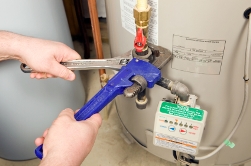What to Ask Plumbing Vocational Schools

Now that you have made a decision to obtain a diploma, certificate or degree, you can begin to refine your training options. Considering that there are so many plumbing vocational and trade schools in the Dartmouth MA region, it's imperative to have a checklist of qualifications that each school must satisfy. The first 2 that we discussed were location and tuition expense. And even though both qualifiers may be crucial when making your decision, there are other factors that need to be considered also. Below is a checklist of those additional qualifications that you will need to analyze prior to enrolling in a plumber trade school.
Is the Plumbing School Accredited? A large number of plumbing trade schools have received either a regional or a national accreditation. They may attain Institutional Accreditation, which focuses on the school's programs as a whole, or Programmatic Accreditation, which relates to a specific program, such as electrical technology. Confirm that the Dartmouth MA program is accredited by a U.S. Department of Education acknowledged accrediting agency, for instance the Accreditation Board for Engineering and Technology. In addition to helping make certain that you receive an excellent education, it may assist in securing financial assistance or student loans, which are often not available for non-accredited schools. Also, a number of states require that the plumbing training program be accredited for it to qualify for licensing or certification.
Is the Plumbing School Licensed? In addition to accreditation, an additional way of determining if a vocational school you’re reiewing is reputable is by making sure that it’s properly licensed. Licensing is typically controlled and regulated by state agencies, such as the Massachusetts Department of Education. If you’re not sure, ask the school which state agency regulates its licensing and then check to ensure that it’s up to date.
How Long has the School been in Business? Another means of determining the quality of a technical school is to find out how long it’s been in business. The longer a school has been in operation, the more likely that its programs are highly rated and regarded. Conversely, schools that are not well regarded or that provide low quality training generally don’t stand the test of time. However, keep in mind that even the best of Dartmouth MA schools had to start from their first day of operation, so only use it as one of several qualifications for each school you are considering.
What are the School’s Completion and Placement Rates? Ask the plumbing schools you are reviewing what their completion rates are. The completion rate is the percentage or portion of students who enroll in and finish the course. A low completion rate might signify that students were disappointed with the program and dropped out. It might also mean that the teachers were not competent to instruct the students. It's also essential that the schools have higher job placement rates. Older and/or more reputable schools may have a more extensive directory of alumni, which can produce more contacts for the school to employ for their apprenticeship and job placement programs. A high job placement rate will not only affirm that the school has a good reputation within the field, but also that it has the network of contacts to help graduates obtain apprenticeships or jobs in the Dartmouth MA area.
Are Apprenticeship Programs Sponsored? Most plumber trade programs are taught in conjunction with an apprenticeship or an internship program. Those participating trade and technical programs will help place you in an apprenticeship program inside their network of plumbing companies or labor unions. Find out if the schools you are comparing have working relationships with local Dartmouth MA plumbers or plumbing specialists. An apprenticeship not only provides a valuable experience by providing practical training, but it also provides job opportunities and helps to build relationships in the area plumbing professional community.
Are there Modern Facilities? Make certain that the campus facilities and the equipment that you will be trained on are up-to-date and what you will be working with in the field. If you are currently in an internship or an apprenticeship, check with the master plumber you are working with concerning what you should be looking for. Otherwise, ask a local Dartmouth MA plumbing company if they can provide some suggestions.
Where is the School Located? Unless you can relocate, the school needs to be within commuting distance of your Dartmouth MA home. Remember that if you decide to attend an out-of-state school, in addition to relocation costs there can be higher tuition charges compared to in-state residents.
Are there Smaller Classes? It's important that you receive as much individualized training as possible, which can be challenging in larger classes. Ask if you can sit in on a few of the classes so that you can observe how large they are and experience the interaction between students and instructors. Speak with several of the students and get their feedback regarding class sizes and instruction. Finally, speak to a few of the teachers and learn what their level of experience is in Dartmouth MA and what degrees or certifications they hold.
Is the Class Schedule Convenient? Make sure that the class schedules for the schools you are assessing are flexible enough to handle your needs. If you are only able to go to classes at night or on weekends near Dartmouth MA, confirm that the schools you are reviewing offer those options. If you can only attend part-time, make sure that the school you select offers part-time enrollment. Also, find out what the protocol is to make-up classes should you miss any because of work, illness or family responsibilities.
